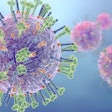
Three practice articles published in the Canadian Medical Association Journal on Tuesday aim to help clinicians diagnose, assess, and treat people with long COVID, a systemic condition that can affect most organ systems in the body.
The articles are entitled "Diagnosing post-COVID-19 condition (long COVID) in adults," "Assessing common and potentially modifiable symptoms of post-COVID-19 condition (long COVID) in adults," and "Treating common and potentially modifiable symptoms of post-COVID-19 condition (long COVID) in adults."
More than 100 symptoms have been reported among people with long COVID, with the most common potentially modifiable symptoms including fatigue, anxiety and depression, shortness of breath, sleep disturbances, and heart palpitations.
Treatment of these potentially modifiable symptoms may include a structured and symptom-guided personalized return-to-activity program to manage fatigue, guideline-directed mental health supports for anxiety and depression, and other interventions to alleviate breathing, sleep, and heart issues.
"I believe that the most important thing that we as healthcare providers can do to support people is to listen and validate their experiences, and to avoid a diagnostic cascade of endless tests and consultations that further tax their limited energy supply," Dr. Kieran Quinn, an author of the CMAJ articles, said in a statement.
Quinn is a general internist and palliative care physician at Sinai Health and an assistant professor at the University of Toronto and Institute of Health Policy, Management and Evaluation.
The authors noted that about 1.4 million people living in Canada have been affected by long COVID after infection or suspected infection with SARS-CoV-2.
The World Health Organization defines long COVID as consisting of symptoms lasting longer than three months after a confirmed or suspected SARS-CoV-2 infection.
However, according to a 2022 Canadian COVID-19 Antibody and Health Survey, nearly 15% of adults in the country with suspected or confirmed SARS-CoV-2 infection had symptoms that lingered past three months.
“Although many people recover from long COVID, some continue to have symptoms and are unable to return to full-time work at [one] year after infection,” the authors wrote.
They noted that fatigue is the most common symptom of long COVID and is “associated with diminished activity tolerance and postexertional malaise, and symptom exacerbation.”
As a result, healthcare providers should assess its frequency, severity, duration, impact, and alleviating and exacerbating physical, cognitive, and psychological factors, the authors report. Sleep hygiene and the effect on daily activities also require monitoring.
“To rule out other causes, a comprehensive history, physical examination, and routine bloodwork including hemoglobin and thyroid-stimulating hormone are important,” the authors added.



















